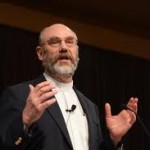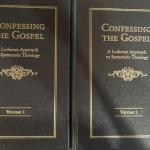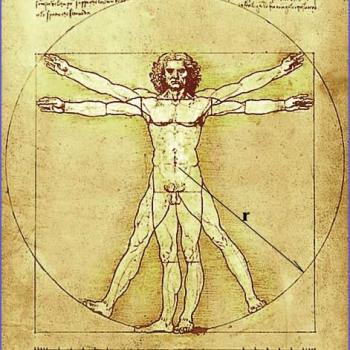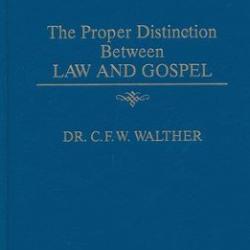
For non-Lutherans, CPH is “Concordia Publishing House”.
For upset Lutherans, please consider taking 14 minutes to listen to one of my pastor’s sermons at the bottom of this page: “The law and love”, from Sept. 10. Faith comes by hearing the word! This should help you get a better handle on how he — someone who more or less agrees with me on these issues — handles the word of truth.
So, this book. There were times in the past week or so when I wondered whether I would have to eat crow for my pre-emptive strikes against CPH’s new book: The Necessary Distinction: a Continuing Conversation on Law and Gospel.
I honestly wish that would have been the case, but I don’t think an apology is necessary. In fact, the book is worse than I ever thought it would be! In sum, it is a mass of confusion for scholars to deal with, much less your typical layperson.[i]
While the book contains much valuable information and I even enjoyed much of what I read – I loved reading about Stephen Lee (97-99) and Stephen Hultgren’s scholarship is really quite amazing (more below) – there is also much that is misleading and certainly un-Luther-like, which I’ll talk about below.

And let me be absolutely clear so there is no mistake. I do believe it’s a good thing a dialogue like this took place between the LC-MS, NALC, ELCA folks, etc. Really, I do — there is no doubt in my mind such talking is desirable and good.
That said, I just don’t think that the LC-MS dialogue partners were chosen wisely, and, more importantly, that this book ever should have been published by Concordia Publishing House, which is devoted to providing only the best and purest teaching for not only pastors, but us laypersons.
They seem to know that themselves, at some level. We’ll call it a felicitous inconsistency.
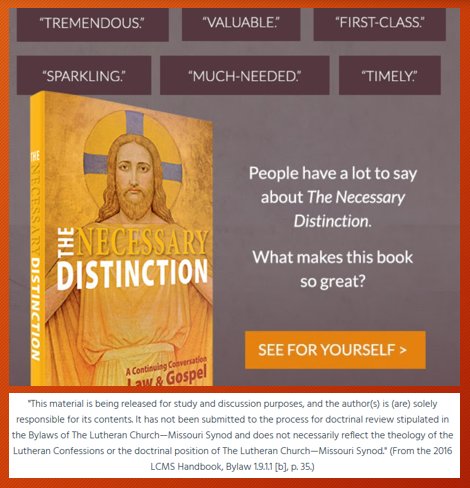
The argument I have about the book’s content is simple really, and I’ll take some time to unfold it here after some initial set-up.
First of all, it is interesting that you have many person who are friendly to the late Gerhard Forde and yet seem to deviate from him not only when it comes to his ideas about the atonement, but also when he says that the law of God is temporal.

For example:
- Stephen Hultgren, in his condensation of his book chapter, states “We can understand divine law for the Christian believer not as the opposite of freedom, but as the proper form by which true freedom is to be shaped.”[ii]
- Mark Mattes writes: “[t]he new person in Christ truly delights in God and in His ways, how God has ordered the cosmos and the limits he has established for our behavior which fosters our own well-being as well as the well-being of others” (133).
- James Nestingen writes that the law’s “eschatological significance always remains,” and that it is eternal in this sense, revealing “the shape of life God intends for the creation and the new creation….[Luther’s catechisms] “spell[] out the elemental requirements of creaturely life…” (175, 183).
This all sounds pretty good. However, one also notes this from Dr. Nestingen:
“Augustine, with the Early Church, took the Greco-Roman tradition of natural law. An order built into the shape of life by creation, in the Christian interpretation of it, arranges everything that has being in a hierarchical order from top to bottom. The law, the lex aterna, preserves this order so that all things will move toward the end assigned to them by their status in the hierarchy of being. Natural law is thus inherent in life and necessary to the shaping of existence.
This has important consequences theologically. To begin with, it makes the Law the original way of salvation…. (170).

Let’s stop right there. That last sentence of Jim Nestingen clears up a lot of things right away. It is why, for example, Wade Johnston can write in his harsh critique about Jordan Cooper’s Lex Aeterna book the following:
“Cooper’s scholasticism is too abstract to preach and not concrete enough to fully confess Christ as a person, flesh and blood, whose incarnation, when it comes to us, was not primarily about being something, but about doing things.”
Why? Because Forde is assumed to be correct while Cooper, in embracing “scholasticism,” has fallen to a law-focused “legal scheme” that basically kills the Gospel. As another Forde disciple, Nicholas Hopman, has put it, when a static lex aeterna—“a theological projection of divine, eternal, objective order”— “becomes the framework for the whole theological system, [it] destroy[s] the inherently eschatological nature (Rom. 10:4) of the law-gospel distinction.”[iii]
But assuming that is a fair way to sum up what the older, post-Luther Lutherans believed (there is room to question here!), why, exactly, do they think this is the case? Why, for example, did the late Gerhard Forde believe that any person who upheld the third use of law inevitably took the position of Erasmus? I suggest the answer is very clear: it comes back to the matter of their view of how the First Article of the Creed should fit into our theology.

As Forde sees it, Erasmus stood with the “entire Western tradition by and large” in his traditional rendering of the fall of man, where the creature was “given a relative perfection in the creation.”[iv] This, he gravely warns “means nothing but trouble for the understanding of sin and freedom” – the “very word ‘fall’” “is not…a good biblical term” (Captivation of the Will, 70).[v]
And this brings us to Naomichi Masaki’s essay in the book on Luther’s Galatians commentary. He says that Luther was not only fighting the “papacy, the enthusiasts, the sacramentarians, and the antinomians alike,” but
“was also fighting against the most powerful and attractive opinion that is inherent in man at the same time: the Law as the original way of salvation. This is what human hearts say. This is also the entire theological tradition both before and after Luther” (italics mine).[vi]
Is this true? That is the core question.
Is Masaki, like Forde, saying that no one previously in church history (post Apostle Paul) had understood that God did not intend for man to live by the law of God, but from the favor of God? Did no one before Luther believe that, in Christ, man could have the peace with God once again that Adam and Eve had had with him in the Garden? Did everyone prior to Luther believe that man, even when perfect in the Garden, needed to be “saved”?
Actually, as I read persons who identify with men like Gerhard Forde, all of these kinds of questions do not seem to occur to them (they do, however, occur to Stephen Hultgren, whose essay really does stand out in this volume). And I think it is because they fundamentally misunderstand the purpose of the original creation and Eden – and many (not all!) early church theologians. In a sense, they think the same things that they claim these old theologians did! The “entire theological tradition… before… Luther” they say Luther found himself fighting against!
My argument here is that they, like Masaki does above, are projecting their own false viewpoint of the creation, fall, and redemption on to all the church’s theologians prior to Luther. They look at Luther’s statement that God threatened Adam and Eve by saying “you will surely die,” and they find this threatening. The law always accuses!

In other words, man, from the beginning, had to deal with a kind of foreign or alien attitude from God: not a pure love which Jesus would demonstrate and could be solely associated with freedom. Rather, they had to deal with something other than a pure love —something which could only be associated with coercion. In short, when God says “you shall surely die,” that is a threat, and that is all you need to know. Period. As Masaki puts it, “The way of the Gospel is not by coercion. The Gospel does not demand; it bestows [God’s] gifts freely” (159).[vii]
The Gospel, in other words, saves us from coercion — even the coercion we feel from God.
For some then, it makes sense to go immediately to what Naomichi Masaki writes here:
“When Luther confessed that the Law was not given to justify but to terrify, accuse and kill, he put himself in enmity against the rest of the theological world. For Luther, the Law was not a description of what man is supposed to do within the structure of the eternal order. Instead, he viewed the Law as what it actually does. It kills” (pp. 153-154, italics mine).
But, as Nestingen acknowledges, Luther talks about how the Decalogue, apart from other parts of the Law, is eternal. This, of course, means that it somehow remains in heaven, revealing as it does “the shape of life God intends for the creation and the new creation”. And so when Jim Nestingen says:
[Augustine’s lex aterna] makes the Law the original way of salvation. The Law must be fulfilled if human beings, who hold a status just below the angels, are to come into the unity with God that is their ultimate purpose. The Law lays down the categories within which grace functions. As Augustine said, ‘Grace gives what the law demands.” (170)
…one notices that for him, the problem, once again, is coercion: “The law must be fulfilled….” Roland Ziegler quotes Werner Elert saying the same thing: “Law denotes our entire reality as the realm ordered by God, but therefore also as a realm of coercion (CE, 81)” (312, TNP).

The problem with this view, however, is that Luther — unlike many modern Lutherans — did not believe that the commands given to man in the garden actually threatened him. He did not believe that Adam and Eve felt any pressure to “be saved”, much less that there was the constant pressure of being critiqued, judged, and assessed! For Luther, even though man did have a “relative perfection in creation” (contra Forde) and could progress in the Garden from a lower state to a higher state, this would not have been because they were attempting to gain salvation, that is, attain peace with God. For man already had everything that he needed with his Creator. And good works for the neighbor’s sake were to flow from the peace found in the knowledge and worship of God.
Teleology, or the purpose of our design, is in view here to, as Luther notes: “What advantage is there in knowing how beautiful a creature is man if you are unaware of his purpose, namely, that he was created to worship God and to live eternally with God?” (AE 1, 131)

But doesn’t Luther himself, at other times, seem to contradict my thesis? After all, in his Genesis commentary, while discussing the negative effects St. Augustine’s view of the image of God[viii] had in the history of the church, Luther, ever concerned to guard the doctrine of justification, says the following:
“…although I do not condemn or find fault with that effort and those thoughts by which everything is brought into relationship with the Trinity, I am not at all sure that they are very useful, especially when they are subsequently spun out further; for there is also added a discussion concerning free will, which has its origin in that image. This is what they maintain: God is free, therefore since man is created according to the image of God, he also has free memory, mind, and will. In this way many statements are carelessly made, statements that are either not properly expressed or later on are understood in a wicked way. Thus this was the origin of the dangerous opinion that in governing men God permits them to act under their own impulse. From this assertion came many inconvenient ideas. It is similar to the quotation: ‘God, who created you without you will not save you without you.’ From here the conclusion was drawn that free will co-operated as the preceeding and efficient cause of salvation. No different is the assertion of Dionysius, though more dangerous than the former, when he says that although the demons and the human beings fell nevertheless their natural endowments, such as the mind, memory, will, etc., remain unimpaired. But if this is true, it follows that by the powers of his nature man can bring about his own salvation” (60, 61, italics mine).

Is Luther saying that even in the Garden of Eden man needed to reach an ideal to be saved? Not at all! Here, Luther is simply concerned about the way that the issue of “free will” has been understood by most in the Western tradition. The idea has developed such that, in his time, even respectable theologians in the church believed that they could be saved by their own efforts apart from grace – by doing what one could.
But everything that Luther writes in his Genesis commentary gives the exact opposite impression — for him, there was no pressure or coercion here! This, I think, can easily be proved (a brief summation and a much more detailed summation). And this is at the root of our controversies about the third use of the law, which is, at bottom, a matter of Christian anthropology.

There are, by the way, in this volume, essays which uphold and attempt to defend the third use of the law (though preaching is not mentioned), from both Mark Mattes and from Stephen Hultgren (non LC-MS folks). Both essays are not without their problems however – Hultgren’s, for all its many strengths, even says that Romans 7 is not Paul as a Christian![ix] – and therefore, this is a small consolation. Roland Ziegler’s essay is particularly disappointing. It sets up strawmen (329), lacks depth (What are the implications of insisting that one should not preach like Paul’s letters? How are those who want the legal institution of same-sex marriage nevertheless against the Law? – see 330), and neglects, for example, to mention Edward Englebrecht’s 2011 book Friends of the Law at what would have been an opportune time (312).
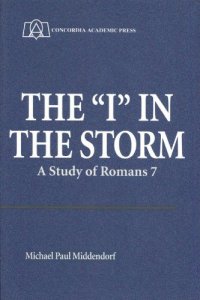
Again, I think that the LC-MS should have gotten partners for this dialogue from its own house who were vigorous defenders of the third use of the law (like Dr. David Scaer and Dr. Joel Biermann), and also that they should have published the papers for free on the internet, without any real fanfare. I know the folks at CPH need to eat, but that is not best done by promoting books that say, for example, that Jesus was justly accused by God’s law (157).
In sum, despite the contrary impressions given on the internet – particularly by the editors of this book who have been hawking it – this book is clearly not something to celebrate. Perhaps if Mattes’ and Hultgren’s and even Nestingen’s essays had served as jumping off points for others who clearly uphold the third use of the law to respond (and rebut), this would have been a great book. As it stands however, the book just gives us another duty for us to fulfill.

FIN
Note: I have changed the text above somewhat (5:45 central time) for the purposes of clarification, filling in some blanks.
Notes:
[i] In sum, I stand by everything I said, when I had only read all the preliminary materials that were available and had heard a podcast interview with the editors.
[ii] As reader Jon Alan Schmidt observes about this paper, “Skimming through it, he does not appear to address the question of whether paraenetic exhortation is appropriate within the sermon.” Jeff Mallinson, from Concordia Irvine has recently written a paper for Concordia Seward’s education journal (where he, incidently, really gets one of my writings wrong in a footnote) where he also argues that exhortation in the sermon is never really necessary if it is being done in other venues.
[iii] pp. 153, 172, Lutheran Quarterly, Spring, 2016. This leads to other interesting conclusions on Hopman’s part:
- “[T]he content of the commandment/law is always a weapon attacking human sin” (159).
- “Where there is no accusation, there is no law” (164)
- “Only where there is freedom from law… can there be love of the law” (167)
- “[T]he law and delight in the law are two mutually exclusive realities” (167)
- “The Christian, in faith alone, is beyond the law” (160)
- The Christian is successful vs. sin because the Christian and Holy Spirit are not law (171)
- “[The] law is present only where Christ is absent” (164), and the Holy Spirit is “the opposite of the law” (166)
- “[T]he fulfillment of the law actually empties the law of all its content, namely, its threatening teeth” (160, italics mine)
[iv] This is exactly what Luther says in his commentary on Genesis (see AE 1). Perhaps what we have here is an “immature very good” (able not to sin) which, through growth in God’s word, moves towards a “mature very good” (not able to sin). See FC VI: 11 ff. One also can consider the Lord Jesus, always free from sin, as regards his growth according to His human nature. We consider that as a child even our Lord “grew in wisdom and stature, and in favor with God and man” (NIV), and, as a part of this experience, gladly heard teachers of the law and, undoubtedly, his parents. This aspect of our creatureliness should surely be kept in mind vs. any interpretation of the new man which, improperly elevating passages like Jeremiah 31: 34, I Cor. 2:15-16, I John 2:27, etc. might insist that the new man never learns through teaching (seeing this as synonymous with coercion!).
[v] Elsewhere in the book we read the following description of this larger Western creation that Forde is critical of:
“The larger Christian tradition begins theologically with creation and the fall. There are certain inherent human characteristics, present by creation, that distinguish humanity from the other creatures of the earth, such as reason and freedom of the will. These powers function in the context of God’s all-embracing law, also inherent to the creation, promoting obedience or turning in the fall toward disobedience. Self-seeking, the force of disobedience, has become the condition of created humanity since the fall, releasing the forces of disorder implicated in the fall.”
[vi] Later he writes: “What we observe from Luther’s confession of the doctrine of the proper distinction between the Law and the Gospel is that unlike the medieval scholastic theology that had gone before him and the default position of the human heart that goes on as long as man exists in the world, the Law is not the ultimate any longer; the Law is not the way of salvation. The Law is now replaced by Christ” (p. 161).
[vii] See also footnote 103 of his article, p. 159.
[viii] Augustine had said that “the image of God is the powers of the soul – memory, the mind or intellect, and will” (60). More: “Augustine has much to say in his explanation of this passage [Gen. 1:26], particularly in his book On the Trinity. Moreover, the remaining doctors in general follow Augustine, who keeps Aristotle’s classification: that the image of God is the powers of the soul – memory, the mind or intellect, and the will. These three, they say, comprise the image of God which is in all men.
Moreover, they say that the similitude (or likeness, as distinct from image) lies in the gifts of grace. Just as a similitude (likeness) is a certain perfection of an image, so, they say our nature is perfected through grace. And so the similitude of God consists in this, that the memory is provided with hope, the intellect with faith, and the will with love. In this way, they say, man is created according to the image of God; that is, he has a mind, a memory, and a will. Likewise, man is created according to the similitude of God; that is, the intellect is enlightened by faith, the memory is made confident through hope and steadfastness, and the will is adorned with love” (60).
[ix] See 190-191, 219-226. Hultgren abandons Luther’s simul, which, somehow, is able to incorporate both “totus-totus” and “partim-partim” dimensions. He also states that FC VI can be nothing other than a “compromise document”. More work needs to be done here, to say the least! All this said, Robert Benne is right when he says that this is the “definitive essay” in the book. There is much valuable and clarifying information in this essay, which should be read by persons who feel a need to delve deeply into FC VI, or, particularly, feel tempted to deny it. As I have been saying, CPH should not have published this book for profit, but the LC-MS should have made these papers freely available without fanfare.

